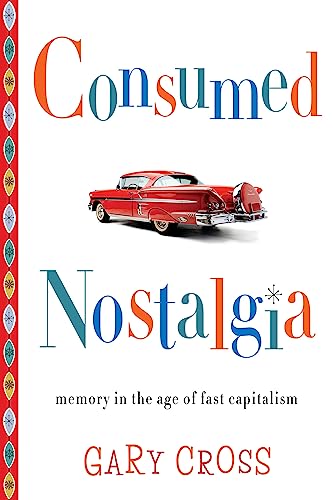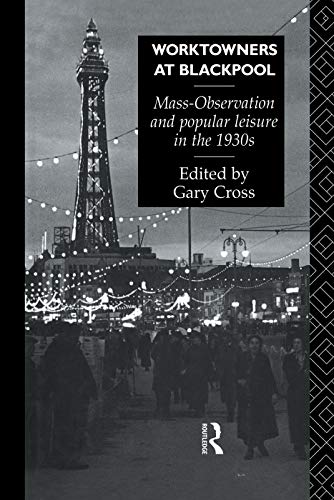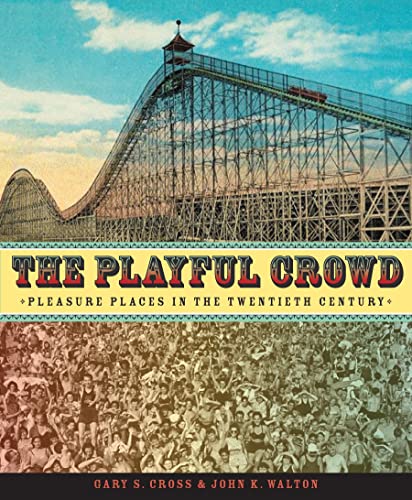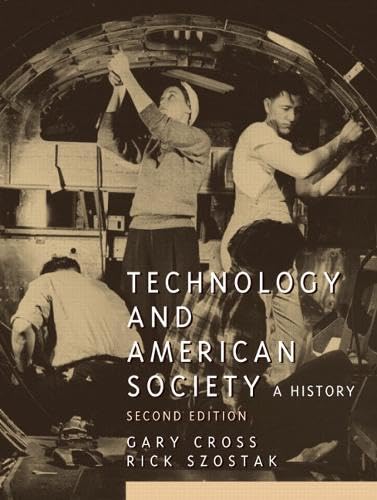Books by Gary Cross
Consumed Nostalgia: Memory in the Age of Fast Capitalism
Author(s): Gary Cross
Publication date: 2015-09-08
ISBN: 023116758X, ISBN-13: 9780231167581
Nostalgia isn't what it used to be. For many of us, modern memory is shaped less by a longing for the social customs and practices of the past or for family heirlooms handed down over generations and more by childhood encounters with ephemeral commercial goods and fleeting media moments in our age of fast capitalism. This phenomenon has given rise to communities of nostalgia whose members remain loyal to the toys, television, and music of their youth. They return to the theme parks and pastimes of their upbringing, hoping to reclaim that feeling of childhood wonder or teenage freedom.
Consumed nostalgia took definite shape in the 1970s, spurred by an increase in the turnover of consumer goods, the commercialization of childhood, and the skillful marketing of nostalgia. Gary Cross immerses readers in this fascinating and often delightful history, unpacking the cultural dynamics that turn pop tunes into oldies and childhood toys into valuable commodities. He compares the limited appeal of heritage sites such as Colonial Williamsburg to the perpetually attractive power of a Disney theme park and reveals how consumed nostalgia shapes how we cope with accelerating change.
Today nostalgia can be owned, collected, and easily accessed, making it less elusive and often more fun than in the past, but its commercialization has sometimes limited memory and complicated the positive goals of recollection. By unmasking the fascinating, idiosyncratic character of modern nostalgia, Cross helps us better understand the rituals of recall in an age of fast capitalism.
Packaged Pleasures: How Technology and Marketing Revolutionized Desire
Author(s): Gary S. Cross, Robert N. Proctor
Publication date: 2014-09-30
ISBN: 0226121275, ISBN-13: 9780226121277
In Packaged Pleasures, Gary S. Cross and Robert N. Proctor delve into an uncharted chapter of American history, shedding new light on the origins of modern consumer culture and how technologies have transformed human sensory experience.  In the space of only a few decades, junk foods, cigarettes, movies, recorded sound, and thrill rides brought about a revolution in what it means to taste, smell, see, hear, and touch.  New techniques of boxing, labeling, and tubing gave consumers virtually unlimited access to pleasures they could simply unwrap and enjoy. Manufacturers generated a seemingly endless stream of sugar-filled, high-fat foods that were delicious but detrimental to health.  Mechanically rolled cigarettes entered the market and quickly addicted millions.  And many other packaged pleasures dulled or displaced natural and social delights. Yet many of these same new technologies also offered convenient and effective medicines, unprecedented opportunities to enjoy music and the visual arts, and more hygienic, varied, and nutritious food and drink. For better or for worse, sensation became mechanized, commercialized, and, to a large extent, democratized by being made cheap and accessible. Cross and Proctor have delivered an ingeniously constructed history of consumerism and consumer technology that will make us all rethink some of our favorite things.
Worktowners at Blackpool: Mass-Observation and Popular Leisure in the 1930s
Author(s): Gary Cross
Publication date: 2014-04-24
ISBN: 0415755379, ISBN-13: 9780415755375
Men to Boys: The Making of Modern Immaturity
Author(s): Gary Cross
Publication date: 2010-07-13
ISBN: 0231144318, ISBN-13: 9780231144315
Adam Sandler movies, HBO's Entourage, and such magazines as Maxim and FHM all trade in and appeal to one character—the modern boy-man. Addicted to video games, comic books, extreme sports, and dressing down, the boy-man would rather devote an afternoon to Grand Theft Auto than plan his next career move. He would rather prolong the hedonistic pleasures of youth than embrace the self-sacrificing demands of adulthood.
When did maturity become the ultimate taboo? Men have gone from idolizing Cary Grant to aping Hugh Grant, shunning marriage and responsibility well into their twenties and thirties. Gary Cross, renowned cultural historian, identifies the boy-man and his habits, examining the attitudes and practices of three generations to make sense of this gradual but profound shift in American masculinity. Cross matches the rise of the American boy-man to trends in twentieth-century advertising, popular culture, and consumerism, and he locates the roots of our present crisis in the vague call for a new model of leadership that, ultimately, failed to offer a better concept of maturity.
Cross does not blame the young or glorify the past. He finds that men of the "Greatest Generation" might have embraced their role as providers but were confused by the contradictions and expectations of modern fatherhood. Their uncertainty gave birth to the Beats and men who indulged in childhood hobbies and boyish sports. Rather than fashion a new manhood, baby-boomers held onto their youth and, when that was gone, embraced Viagra. Without mature role models to emulate or rebel against, Generation X turned to cynicism and sensual intensity, and the media fed on this longing, transforming a life stage into a highly desirable lifestyle. Arguing that contemporary American culture undermines both conservative ideals of male maturity and the liberal values of community and responsibility, Cross concludes with a proposal for a modern marriage of personal desire and ethical adulthood.
The Playful Crowd: Pleasure Places in the Twentieth Century
Author(s): Gary Cross, John K. Walton
Publication date: 2005-10-18
ISBN: 0231127243, ISBN-13: 9780231127240
During the first part of the twentieth century thousands of working-class New Yorkers flocked to Coney Island in search of a release from their workaday lives and the values of bourgeois society. On the other side of the Atlantic, British workers headed off to the beach resort of Blackpool for entertainment and relaxation. However, by the middle of the century, a new type of park began to emerge, providing well-ordered, squeaky-clean, and carefully orchestrated corporate entertainment. Contrasting the experiences of Coney Island and Blackpool with those of Disneyland and Beamish, Gary S. Cross and John K. Walton explore playful crowds and the pursuit of pleasure in the twentieth century to offer a transatlantic perspective on changing ideas about leisure, class, and mass culture.
Blackpool and Coney Island were the definitive playgrounds of the industrial working class. Teeming crowds partook of a gritty vulgarity that offered a variety of pleasures and thrills from roller coaster rides and freak shows to dance halls and dioramas of exotic locales. Responding to the new money and mobility of the working class, the purveyors of Coney Island and Blackpool offered the playful crowd an "industrial saturnalia."Cross and Walton capture the sights and sounds of Blackpool and Coney Island and consider how these "Sodoms by the sea" flouted the social and cultural status quo. The authors also examine the resorts' very different fates as Coney Island has now become a mere shadow of its former self while Blackpool continues to lure visitors and offer new attractions.
The authors also explore the experiences offered at Disneyland and Beamish, a heritage park that celebrates Britain's industrial and social history. While both parks borrowed elements from their predecessors, they also adapted to the longings and concerns of postwar consumer culture. Appealing to middle-class families, Disney provided crowds a chance to indulge in child-like innocence and a nostalgia for a simpler time. At Beamish, crowds gathered to find an escape from the fragmented and hedonistic life of modern society in a reconstructed realm of the past where local traditions and nature prevail.
The Cute and the Cool: Wondrous Innocence and Modern American Children's Culture
Author(s): Gary Cross
Publication date: 2004-04-01
ISBN: 0195156668, ISBN-13: 9780195156669
Encyclopedia of Recreation & Leisure in America (2 Volume Set)
Author(s): Gary S. Cross
Publication date: 2004-07-15
ISBN: 0684312654, ISBN-13: 9780684312651
Technology and American Society (2nd Edition)
Author(s): Gary Cross, Rick Szostak
Publication date: 2004-10-02
ISBN: 0131896431, ISBN-13: 9780131896437
In a single volume, this book combines the history of invention and the interactions of technology with social, economic, cultural, and military change throughout the course of American history. It illustrates the gradual shift from the era of individual artisan inventors to emergence of science-based corporate technology, and links the origins and development of American innovation to the global transformation of industry, agriculture, and transportation. For professionals in any industry influenced by technology.
An All-Consuming Century: Why Commercialism Won in Modern America
Author(s): Gary Cross
Publication date: 2002-04-15
ISBN: 0231113137, ISBN-13: 9780231113137
The unqualified victory of consumerism in America was not a foregone conclusion. The United States has traditionally been the home of the most aggressive and often thoughtful criticism of consumption, including Puritanism, Prohibition, the simplicity movement, the '60s hippies, and the consumer rights movement. But at the dawn of the twenty-first century, not only has American consumerism triumphed, there isn't even an "ism" left to challenge it. An All-Consuming Century is a rich history of how market goods came to dominate American life over that remarkable hundred years between 1900 and 2000 and why for the first time in history there are no practical limits to consumerism.
By 1930 a distinct consumer society had emerged in the United States in which the taste, speed, control, and comfort of goods offered new meanings of freedom, thus laying the groundwork for a full-scale ideology of consumer's democracy after World War II. From the introduction of Henry Ford's Model T ("so low in price that no man making a good salary will be unable to own one") and the innovations in selling that arrived with the department store (window displays, self service, the installment plan) to the development of new arenas for spending (amusement parks, penny arcades, baseball parks, and dance halls), Americans embraced the new culture of commercialism―with reservations. However, Gary Cross shows that even the Depression, the counterculture of the 1960s, and the inflation of the 1970s made Americans more materialistic, opening new channels of desire and offering opportunities for more innovative and aggressive marketing. The conservative upsurge of the 1980s and '90s indulged in its own brand of self-aggrandizement by promoting unrestricted markets. The consumerism of today, thriving and largely unchecked, no longer brings families and communities together; instead, it increasingly divides and isolates Americans.
Consumer culture has provided affluent societies with peaceful alternatives to tribalism and class war, Cross writes, and it has fueled extraordinary economic growth. The challenge for the future is to find ways to revive the still valid portion of the culture of constraint and control the overpowering success of the all-consuming twentieth century.
Kids' Stuff: Toys and the Changing World of American Childhood
Author(s): Gary Cross
Publication date: 1999-11-15
ISBN: 067450335X, ISBN-13: 9780674503359
To sort out who's who and what's what in the enchanting, vexing world of Barbies® and Ninja Turtles®, Tinkertoys® and teddy bears, is to begin to see what's become of childhood in America. It is this changing world, and what it unveils about our values, that Gary Cross explores in Kids' Stuff, a revealing look into the meaning of American toys through this century.
Early in the 1900s toys reflected parents' ideas about children and their futures. Erector sets introduced boys to a realm of business and technology, while baby dolls anticipated motherhood and building blocks honed the fine motor skills of the youngest children. Kids' Stuff chronicles the transformation that occurred as the interests and intentions of parents, children, and the toy industry gradually diverged--starting in the 1930s when toymakers, marketing playthings inspired by popular favorites like Shirley Temple and Buck Rogers, began to appeal directly to the young. TV advertising, blockbuster films like Star Wars®, and Saturday morning cartoons exploited their youthful audience in new and audacious ways. Meanwhile, powerful social and economic forces were transforming the nature of play in American society. Cross offers a richly textured account of a culture in which erector sets and baby dolls are no longer alone in preparing children for the future, and in which the toys that now crowd the racks are as perplexing for parents as they are beguiling for little boys and girls. Whether we want our children to be high achievers in a competitive world or playful and free from the worries of adult life, the toy store confronts us with many choices.
What does the endless array of action figures and fashion dolls mean? Are children--or parents--the dupes of the film, television, and toy industries, with their latest fads and fantasies? What does this say about our time, and what does it bode for our future? Tapping a vein of rich cultural history, Kids' Stuff exposes the serious business behind a century of playthings.
Time and Money: The Making of Consumer Culture
Author(s): Gary S. Cross
Publication date: 1993-05-06
ISBN: 0415070023, ISBN-13: 9780415070027
A Quest for Time: The Reduction of Work in Britain and France, 1840-1940
Author(s): Gary Cross
Publication date: 1989-06-08
ISBN: 0520065328, ISBN-13: 9780520065321
A Social History of Leisure Since 1600
Author(s): Gary S. Cross
Publication date: 0000-00-00
ISBN: 0910251355, ISBN-13: 9780910251358
Worktime and Industrialization: An International History (Labor and Social Change)
Author(s): Gary Cross
Publication date: 0000-00-00
ISBN: 0877225826, ISBN-13: 9780877225829
Immigrant Workers in Industrial France: The Making of a New Laboring Class
Author(s): Gary S. Cross
Publication date: 0000-00-00
ISBN: 0877223009, ISBN-13: 9780877223009
Penn State University : History
- Jessamyn Abel
- Eliyana Adler
- David Atwill
- Kathleen Baldanza
- Dan Beaver
- William Blair
- Jennifer Boittin
- Erica Brindley
- Tobias Brinkmann
- Jonathan Brockopp
- Gary Cross
- Sophie De Schaepdrijver
- Greg Eghigian
- Garrett Fagan
- Lori Ginzberg
- Amy Greenberg
- Jens-Uwe Guettel
- Ronnie Hsia
- Benjamin Hudson
- Anthony Kaye
- Michael Kulikowski
- Prakash Kumar
- Daniel Letwin
- Russell Lohse
- Bryan McDonald
- Kate Merkel-Hess
- Mark Munn
- On-Cho Ng
- Maia Ramnath
- Carol Reardon
- Matthew Restall
- A. Gregg Roeber
- Anne Rose
- Nina Safran
- Kathryn Salzer
- Crystal Sanders
- Tatiana Seijas
- Gregory Smits
- Catherine Wanner
- Nan Elizabeth Woodruff
- Ran Zwigenberg
Most popular books
Link to this page using the following URL: https://www.facultybookshelf.org/author/gary_cross














